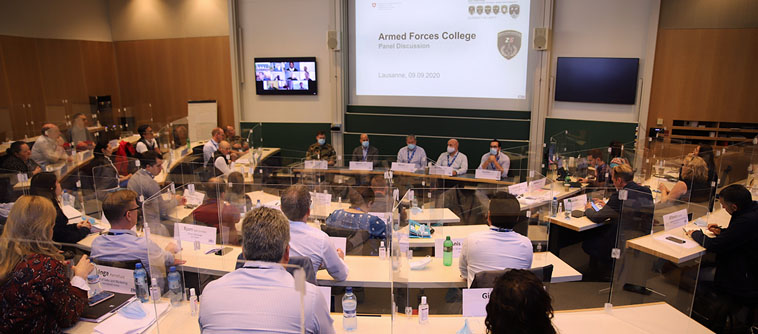The COVID-19 pandemic has exposed the need for effective and efficient leadership in a crisis. To prepare for this and other new challenges, 54 participants took a course in military crisis management for civilian executives as part of their EMBA degree at IMD.
While crisis training has been offered since 2015 at IMD, this year’s program had to take the added pressure of the COVID-19 pandemic into account. As the management team of a fictitious airline, the group had to cope with multiple crises simultaneously. To accomplish this, these global managers learned how to apply the particular leadership skills of the Swiss Armed Forces – and what began in chaos ended with real insight for the civilian leaders.
Do not get lost in details and do not micromanage
This is not easy if you, as a manager of an airline, are confronted with emergency situations such as a plane crash, food poisoning and a non-functioning baggage handling system. The central goal and probably the greatest challenge of the two-day crisis management exercise was to continue strategic management under adversity. To do this, it was necessary to maintain an overview and to separate the important from the unimportant.
“All the issues came at once, which was taxing” said Longfellow Atakele, General Manager Assets for Platform Pertroleum Ltd, who managed operations during the simulation. “This type of preparation is essential in order to manage a crisis well.”
Under the guidance of crisis experts, the EMBA participants learned how to master these tasks, for which the proven management instruments of the Swiss Armed Forces served as a basis. Due to Corona-related travel restrictions, 17 participants completed the exercise online via videoconferencing and other digital means of collaboration – all accompanied by the team in Switzerland.
Crisis simulation
The well-known military training method “demonstrate, participate, imitate” was not applied in this exercise. Rather, participants were thrown directly and without assistance into the crisis situations. They experienced the feelings of stress and being overburdened, just as they would in a real crisis. Only after this experimental phase did the trainers begin to teach. They included both active and former professional officers and senior staff officers who taught the trainees how to use the appropriate models.
“The beginning was extremely chaotic,” said Inga Korneliusa, Head of Sales and Marketing Avis Budget Russia. “But after the trainers taught us how to use them correctly, with a little practice, the tools were useful for crisis management”.
With regard to the pandemic, she admitted: “Until the Corona crisis, I had little interest in crisis management. But now I try to absorb everything that can be useful in a crisis. These tools are ideal for this, and I will present them to my management when I return.”
Wael El-Afghani, Head of Dental Research at a hospital in Kuwait, described the training as an extremely good investment in the future and greatly appreciated the fact that active and former officers and senior staff officers were integrated into the exercise – something he had never seen before.
Benefits of military leadership training in civilian life
Since 2015, the IMD EMBA Crisis Management module has been led by Kenel Crisis Leadership Training. The military foundations on which the exercise was based, as well as its training, were the responsibility of the Command for Management, Communication and Information Training (MIKA).
Colonel General Staff Mark Eigenheer, Commander MIKA, was pleased to offer a shortened officer training program (due to the virus precautions). He explained: “I wanted to show the heads of private companies how valuable military cadre training is. And when a crisis situation arises, the participants should remember the basic things like the systematic approach.
“The Corona crisis affects every company around the world,” said Stefan Michel, Dean of the EMBA program. “It was precisely in this extraordinary situation that the number of inquiries from alumni was particularly high. They recognized the practical benefits of their training at that time and therefore requested the course material again.”
Valuable strategic partnership between IMD and the Swiss Army
Yet again, the military crisis management training was a vital exercise for everyone involved – the EMBA participants, Army officers and civilian experts alike. The positive experiences and feedback of the alumni during the past few years prove the importance of the cooperation between IMD and the Swiss Army.
“The Swiss Army and IMD are united by a real partnership from which both sides benefit,” said Michel.



